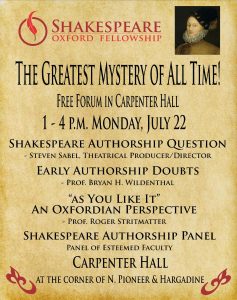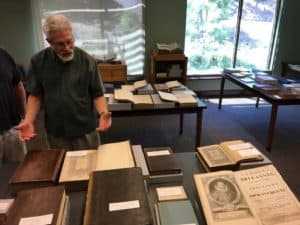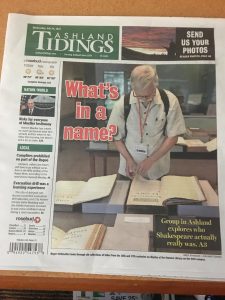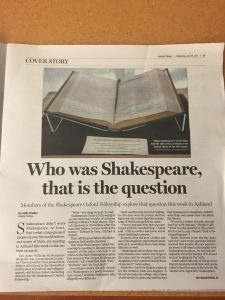
Shakespeare Oxford Fellowship sponsored its third Shakespeare Authorship Summer Seminar in Ashland, Oregon, from Monday, July 22 to Friday, July 26, 2019. This year’s program attracted almost 50 participants, who gathered together over a five-day span of presentations and three evenings of plays. The focus of this year’s seminar was on the Shakespeare plays in production at the Oregon Shakespeare Festival (OSF), As You Like It, All’s Well that Ends Well, and Macbeth. The instructors included Roger Stritmatter, Shelly Maycock, Bryan Wildenthal, Bonner Cutting, Steven Sabel, and Earl Showerman.
The SOF seminar was preceded by a free-to-the-public, three-hour series of presentations by seminar faculty on Monday in Carpenter Hall, which is immediately adjacent to the OSF theatres. The Carpenter Hall forum was well-attended and followed by an opening reception for seminar participants at the home of Carole Sue Lipman, longtime President of the Los Angeles Shakespeare Authorship Roundtable. Plenary sessions of the seminar were held over the next three days in the Meese Room at Hannon Library on the campus of Southern Oregon University. In 2016, the Hannon Library was listed among the top twenty university libraries in the United States, and the Margery Bailey Collection has nearly 8,000 Shakespeare and Renaissance titles.

A special exhibit of 16th and 17th century folio editions from the Bailey Collection was curated by reference librarian Mary Jane Cedar Face, and placed on display during the seminar. Titles exhibited included Shakespeare’s Second and Fourth Folios, Jonson’s Folios, a Beaumont and Fletcher Folio, both Holinshed’s and Hall’s Chronicles, William Camden’s Britannia, Plutarch’s Parallel Lives and Nicholas Rowe’s 1714 second edition, which included the first attempt at a biography of Shakespeare.
All seminar attendees received extensive documentation by emails and by the printed syllabus, which included chapters from Kevin Gilvary’s Dating Shakespeare’s Plays and William Farina’s De Vere as Shakespeare, abstracts, and extensive bibliographic citations to Oxfordian publications pertinent to the plays in production. By virtue of a special grant by Ashland resident and seminar participant Toni Dockter, all seminar participants will be provided with a complimentary copy of the latest Brief Chronicles edition, edited by Roger Stritmatter, The Shakespeare Authorship Sourcebook: A Workbook for Teachers and Students.

Morning sessions were conducted by Roger Stritmatter and Shelly Maycock, and included small group discussions and presentations, as well as debriefing sessions of plays we had experienced the previous evenings. The afternoon sessions were driven by a series of talks on a wide variety of topics. Bonner Cutting presented a preview of her SOF Hartford Conference talk, “Connecting the Dots: How did a man who could scarcely write his name become revered as the greatest writer in the English language?” Later Cutting spoke on “Evermore in Subjection: Wardship and Its Impact on Edward de Vere”, and “Let the Punishment Fit the Crime: Censorship and Punishment in Early Modern England,” arguments addressed in her 2018 book, Necessary Mischief. Bryan Wildenthal also presented on three afternoons on a variety of topics taken from his 2019 book, Early Shakespeare Authorship Doubts. Both of these excellent books are available online.
Steven Sabel presented a “Shakespeare Authorship 101” talk at Carpenter Hall, and then pre-viewed his highly dramatic discourse on “Shakespeare: Playwright and Stage Director,” which highlighted the author’s brilliant use of scansion and caesura, to be delivered in Hartford. Shelly Maycock spoke on “The Developmental Curve between All’s Well that Ends Well and As You Like It,” and Earl Showerman presented “Shakespeare’s Physic: Hermetic and Alchemical Magic in The Winter’s Tale, Pericles, and All’s Well that Ends Well” and “Macbeth and the Oresteia.” Each afternoon session ended with a seminar faculty panel discussion.

SOF PR Director Steven Sabel, host of the podcast series “Don’t Quill the Messenger,” managed to leverage our events to first page coverage of the summer seminar in articles that appeared in both the Ashland Tidings and Medford Mail Tribune on July 24. Reporter Caitlin Fowlkes, at the prompting of her editor, interviewed Sabel, Roger Stritmatter, seminar coordinator Earl Showerman, and several attendees for the most expansive coverage of a Shakespeare authorship event ever to be published in southern Oregon. Charlotte Hughes, a longtime Oxfordian from Los Angeles, was quoted in the article as noting that the fact that Shakespeare’s daughters could not write their own names raised suspicion about the validity of the traditional theory of authorship. “If you are a seeker of truth, you get fired up with outrage. What was the material in this artist’s life that led to, say, Hamlet? That is the compelling part.”
Fowlkes’s Tribune article. “To be, or not to be Shakespeare … that is the question” began with the bold assertion that, “Shakespeare didn’t write Shakespeare. At least that is what a large group of people all over the world believe, and many of them are meeting in Ashland this week to discuss their research.” Steven Sabel provided most of the commentary, and made the poignant observation, “That is de Vere’s life on stage. That’s what matters. When I see the play, I can better appreciate the pain of all the parts.” It is my hope and expectation that the final lines of Fowlkes’s story prove to be prophetic: “Between 150 and 200 scholars are expected to attend the Shakespeare Oxford Fellowship annual conference in Ashland in the fall of 2020.”


